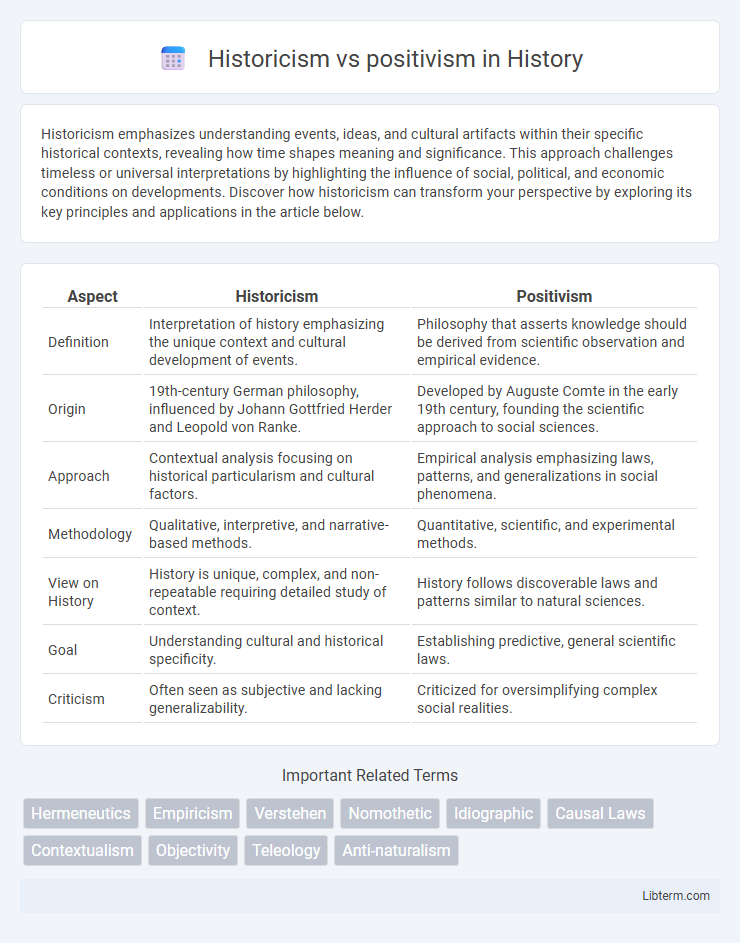Historicism emphasizes understanding events, ideas, and cultural artifacts within their specific historical contexts, revealing how time shapes meaning and significance. This approach challenges timeless or universal interpretations by highlighting the influence of social, political, and economic conditions on developments. Discover how historicism can transform your perspective by exploring its key principles and applications in the article below.
Table of Comparison
| Aspect | Historicism | Positivism |
|---|---|---|
| Definition | Interpretation of history emphasizing the unique context and cultural development of events. | Philosophy that asserts knowledge should be derived from scientific observation and empirical evidence. |
| Origin | 19th-century German philosophy, influenced by Johann Gottfried Herder and Leopold von Ranke. | Developed by Auguste Comte in the early 19th century, founding the scientific approach to social sciences. |
| Approach | Contextual analysis focusing on historical particularism and cultural factors. | Empirical analysis emphasizing laws, patterns, and generalizations in social phenomena. |
| Methodology | Qualitative, interpretive, and narrative-based methods. | Quantitative, scientific, and experimental methods. |
| View on History | History is unique, complex, and non-repeatable requiring detailed study of context. | History follows discoverable laws and patterns similar to natural sciences. |
| Goal | Understanding cultural and historical specificity. | Establishing predictive, general scientific laws. |
| Criticism | Often seen as subjective and lacking generalizability. | Criticized for oversimplifying complex social realities. |
Introduction to Historicism and Positivism
Historicism emphasizes understanding social and cultural phenomena through the context of historical development, asserting that meaning evolves over time and cannot be separated from its historical setting. Positivism advocates for knowledge derived from empirical, observable, and scientific evidence, promoting laws and patterns that can be quantified and generalized across contexts. The debate between historicism and positivism centers on whether historical context or empirical data should dominate the interpretation of social realities.
Philosophical Foundations of Historicism
Historicism's philosophical foundation is rooted in the belief that social and cultural phenomena must be understood in their historical context, emphasizing the uniqueness and temporal development of events. It opposes the positivist view which seeks universal laws through empirical observation and scientific methods, asserting that historical processes are influenced by complex human experiences and values that cannot be reduced to generalizable principles. Key thinkers like Wilhelm Dilthey and Giambattista Vico criticized positivism's neglect of historical specificity and stressed interpretive understanding (Verstehen) as essential for studying human society.
Core Principles of Positivism
Positivism is grounded in the belief that knowledge should be derived from empirical evidence obtained through sensory experience and scientific methods, emphasizing observation and experimentation over metaphysical speculation. It asserts that social phenomena can be studied objectively using quantitative data and reproducible experiments, aiming for generalizable laws of human behavior. This approach contrasts with Historicism, which prioritizes understanding unique historical contexts and subjective interpretations over universal scientific laws.
Methodological Differences
Historicism emphasizes understanding social phenomena through historical context, employing qualitative methods like interpretive analysis and case studies to explore cultural and temporal specificities. Positivism relies on empirical observation and measurement, using quantitative methods such as experiments and surveys to identify generalizable laws and cause-effect relationships. The methodological divergence highlights historicism's focus on meaning within time-bound settings, contrasting with positivism's pursuit of objective, replicable knowledge.
Historicism and the Study of History
Historicism emphasizes understanding historical events within their unique cultural and temporal contexts, rejecting universal laws in favor of interpreting specific human experiences. This approach prioritizes the depth of historical narratives, highlighting the significance of social, political, and economic factors that shape periods and movements. The study of history through historicism advances the idea that history is a dynamic process, influenced by the perspectives and values of the time.
Positivism in Social Sciences
Positivism in social sciences emphasizes empirical observation and scientific methods to study social phenomena, asserting that only observable, measurable facts constitute valid knowledge. It rejects metaphysical explanations and focuses on data collection, statistical analysis, and hypothesis testing to uncover laws governing social behavior. This approach prioritizes objectivity and replicability to ensure reliable and generalized social theories.
Key Figures in Historicism and Positivism
Key figures in historicism include Wilhelm Dilthey, who emphasized understanding social phenomena through historical context, and Benedetto Croce, who viewed history as a continuous process shaped by human experiences. In positivism, Auguste Comte is a central figure, advocating for empirical observation and scientific methods to study society, while Emile Durkheim established sociology as a discipline grounded in positivist principles. These thinkers laid the foundation for contrasting approaches: historicism's focus on subjective interpretation versus positivism's emphasis on objective, observable facts.
Criticisms of Historicism
Criticisms of Historicism emphasize its tendency to relativism, undermining universal scientific laws by insisting that social phenomena must be understood only within their specific historical contexts. Critics argue historicism often neglects empirical verification, leading to subjective interpretations that lack predictive power characteristic of positivism's emphasis on observable, measurable facts. This approach may hinder objective analysis by overemphasizing cultural and temporal specificity at the expense of generalizable knowledge.
Critiques of Positivism
Critiques of positivism highlight its limitation in ignoring the complex, subjective nature of social phenomena that historicism emphasizes through context and interpretation. Positivism's reliance on empirical data and scientific methods often overlooks the historical and cultural specificity that shapes human behavior and social structures. Historicists argue that positivism fails to account for the fluidity of meanings and the influence of power relations embedded in historical narratives.
Contemporary Relevance and Applications
Historicism emphasizes understanding historical context and social conditions, influencing contemporary fields like cultural studies, law, and political science by promoting nuanced analysis of societal trends and policies. Positivism drives modern empirical research methodologies in sciences, economics, and data analytics by asserting that knowledge should be grounded in observable, measurable evidence. Both frameworks remain critical in interdisciplinary approaches, balancing contextual interpretation with data-driven validation in addressing current global challenges.
Historicism Infographic

 libterm.com
libterm.com